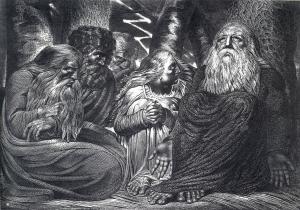 The key to understanding the book of Job is a careful evaluation of the speeches of YHWH in chaps. 38-42. It is nearly impossible to assess the vast number of analyses of these chapters and the wildly different ways interpreters have understood them. Anything I might have to say has surely been said before by numerous commentators, but what I can offer, I think, is a close connection to the material that precedes the speeches of God and how important it is to see that connection. The appearance of God in the book has been long and exhaustingly delayed; any reader is more than anxious to hear what God has to say at the end of the very long debate between Job and his four friends; Elihu is friend number four, but his appearance in chaps 32-37 is not only sudden and surprising but his disappearance is equally sudden. The epilogue (42:7-17) refers only to Job and his three friends (42:7). Yet, I have long imagined that the lengthy speech of Elihu serves the book as a kind of comic relief.
The key to understanding the book of Job is a careful evaluation of the speeches of YHWH in chaps. 38-42. It is nearly impossible to assess the vast number of analyses of these chapters and the wildly different ways interpreters have understood them. Anything I might have to say has surely been said before by numerous commentators, but what I can offer, I think, is a close connection to the material that precedes the speeches of God and how important it is to see that connection. The appearance of God in the book has been long and exhaustingly delayed; any reader is more than anxious to hear what God has to say at the end of the very long debate between Job and his four friends; Elihu is friend number four, but his appearance in chaps 32-37 is not only sudden and surprising but his disappearance is equally sudden. The epilogue (42:7-17) refers only to Job and his three friends (42:7). Yet, I have long imagined that the lengthy speech of Elihu serves the book as a kind of comic relief.
He concludes his quite windy address to Job, saying little that has not already been said by the three friends of the dialogue, by advising Job in chap.37 to “Listen, listen to the thunder of God’s voice, the rumbling that comes from God’s mouth” (37:2). But he concludes by reminding Job that he is not God (vss. 14-18), and warning him that God should never be told that one wishes to speak to God (20), implying clearly that Job can give up any notion that God will ever speak to him, because God is “the Almighty— we cannot find him” (23)! But the joke is on Elihu, because the next voice we hear is none other than the voice of YHWH, thundering from the storm wind. And the first words from God’s mouth are extremely important to grasp correctly.
“Who is this who obscures design with words devoid of knowledge?” The usual translation of the word I have rendered as “design” is “counsel,” and it can mean that. But in the long debate, what is at stake is the very design of the universe. If it is true that God is in the business of rewarding the righteous and punishing the wicked, then Job is getting exactly what he deserves and the friends are proven right. On the other hand, if God does not reward and punish as the friends assume, and even Job has believed, then the universe is not so simple a place after all, and the God who is its creator is not so simple either. God’s first sally to Job is that Job has “obscured” or “darkened” or perhaps confused the design of things with words that lack any kind of real knowledge. In short, what Job has been saying is little more than nonsense in the ears of God, and that also means that what the friends have been saying may be classed in the same way. The God of reward and punishment is apparently not the God of the universe at all. .
Well, if that is not the God of it all, then just who is God? God proceeds to challenge Job to “Gird up your loins like a warrior! I will question you, and you will reply” (38:3)! And so, the ignorance of Job is challenged by the call of God; Job will need to pay careful attention to the divine questions to follow, and he will be expected to make a reasonable response. But in the long series of questions that ensue, from 38:4- 39:30, YHWH asks questions the answer to which can only be, “I do not know!” Beginning with meteorological issues of wind, rain, snow and ice, and ending with questions about the care of wild animals from lions to ostriches, YHWH bombards Job with queries that reveal the vast work of God in the universe, suggesting directly that Job can do none of that. This fact has lead many interpreters to conclude that what these grand speeches are designed to do is to shut Job up. How dare he, or we, question any action of the glorious creator? In effect, they agree with Job at 40:4-5, when Job responds to this flurry of questions, “Look! I am trivial; what shall I answer you? I lay my hand on my mouth! I have spoken once, but I will not answer, twice, but proceed no further!” God has asked Job to reply, but Job refuses. Job shuts up, but that was not God’s intent at all for the speeches as God made clear at 38:3. Job has been cowed, but that is not what God had in mind.
Then what does God have in mind with this huge catalogue of divine power and care for the cosmos? Since Job is so far “without knowledge,” surely the speeches of God are designed to offer him, and us, some new knowledge. And what might that be? I would suggest at least two pieces of new insight are provided in God’s address. First, Job is not the center of the universe; the world does not revolve around Job and his supposed justice. Job has complained from the beginning that what he thinks he deserves he has not received, and because of that God is a monster, an uncaring sadist who cares nothing for the world at all. To the contrary, says God! Not only does God care for the weather of the world, not only does God provide for all the earth’s wild creatures (all the animals mentioned in 38:39-40:30 are wild ones, including the war horse of 39:19-25, hardly the tame horse of human control), but by implication Job can do none of it and has nothing to do with its operation. Note especially 38:25-27 where there are places where grass grows at God’s command, and rain waters that grass, while no human ever sees any of these events happen.
The second insight is that the world does not work mechanically at all; we do not live in a world that operates like some sort of machine. To the contrary! Creatures die that others may live; see the statements about the eagle’s prey in 39:27-30. Nature is truly red in tooth and claw, and it all is part of YHWH’s design. The universe is a place of grit, of hardscrabble life, and reward and punishment have nothing to do with it. This is made all the more clear in YHWH’s second speech where Job is introduced to the giant mythological Canaanite creature Behemoth, the Beast par excellence, whom ancient believers imagined dwelled under the ground, and when he arched his back the ground trembled with earthquake. YHWH says to Job, “Look at Behemoth, which I made just as I made you” (40:15). If God creates Behemoth just as much as God created Job, the world is a mysterious and sometimes random place, not a place that always demonstrates simple and easily understood activity. The world is God’s all right, but that world is at the same time wonderful and dangerous, beautiful and ugly, grand and gritty.
In my two previous essays on Job, I tried to make the point that the loss of a careful reading of Job was an immense loss to the church. Here we see that loss again. For how many centuries have faithful believers imagined that God was in the business of rewarding their good behaviors and punishing their bad behaviors? As a pastor, I encountered more than a few parishioners who tried to explain the terrible things that happened to them—the death of a child or spouse or the loss of a job—by telling me that their problematic actions directly called forth the negative response of God, not enough trips to church or not enough giving to or care of the poor or too much drinking. No, says Job! No one can always know what the universe has in store for us, because the universe operates often unaware of us completely, though God reminds us continually of God’s continual concern for us and for all of what God has created. But that God is no gumball machine in the sky, handing out the goodies for all who put in the right number of coins. God loves us all right, and unreservedly, but that love is not dependent on what I do or do not do. Job taught us that lesson long ago, but so many of us have yet failed to learn it.
(Images from Wikimedia Commons)











